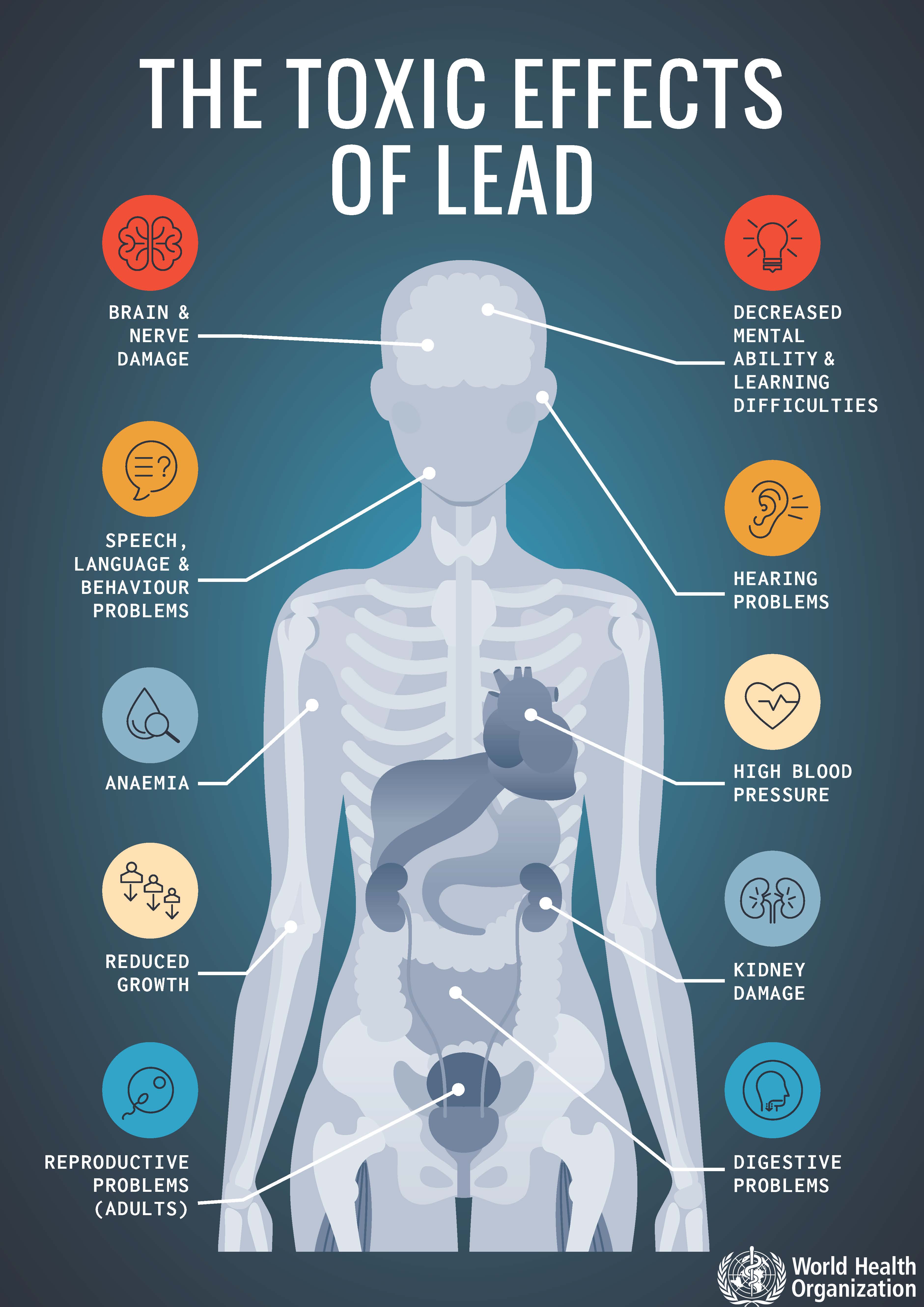
Lead poisoning, a silent and pervasive threat, has plagued human societies for centuries. Despite advancements in public health, the detrimental effects of lead exposure persist, affecting millions worldwide.
Sources of Lead Exposure:
a. Lead-based Paint:
One of the primary sources of lead exposure is lead-based paint, commonly found in older homes and buildings. As the paint deteriorates over time, it can create lead dust or chips, posing a significant risk, especially to children who may ingest lead particles through hand-to-mouth contact.
b. Contaminated Water:
Lead can enter drinking water through corroded pipes or plumbing systems containing lead. This is particularly problematic in areas with outdated infrastructure, where water quality may be compromised. Infants who consume formula mixed with contaminated water are at higher risk, as are adults who regularly consume water from contaminated sources.
c. Occupational Exposure:
Certain industries, such as construction, battery manufacturing, and lead smelting, expose workers to elevated levels of lead. Occupational exposure can occur through inhalation of lead dust or fumes, as well as skin contact with lead-containing materials.
d. Imported Goods:
Some imported goods, especially those from regions with lax lead regulations, may contain lead-based materials. Items such as toys, jewelry, and cosmetics have been known to pose risks, particularly to children who may inadvertently ingest or handle these items.
Symptoms of Lead Poisoning:
a. In Children:
Lead poisoning can have severe consequences on children, affecting their physical and cognitive development. Common symptoms include developmental delays, learning difficulties, irritability, loss of appetite, weight loss, and fatigue. In severe cases, lead poisoning can lead to convulsions or coma.
b. In Adults:
Adults exposed to lead may experience symptoms such as high blood pressure, joint pain, abdominal pain, headaches, memory loss, and reproductive issues. Chronic exposure can lead to anemia, kidney damage, and neurological disorders. Pregnant women are particularly vulnerable, as lead can pass through the placenta, impacting fetal development.
Consequences of Lead Poisoning:
a. Neurological Effects:
Lead has a profound impact on the nervous system, especially in developing children. Even low levels of exposure can result in cognitive deficits, lowered IQ, and behavioral problems. The effects are often irreversible, emphasizing the critical importance of preventing exposure during the early stages of life.
b. Cardiovascular Effects:
Chronic exposure to lead is associated with an increased risk of high blood pressure and cardiovascular diseases. Lead interferes with the normal functioning of blood vessels, contributing to hypertension and potentially leading to heart attacks and strokes.
c. Renal Damage:
Lead is known to accumulate in the kidneys, causing renal damage over time. Kidney function may be impaired, leading to conditions such as nephropathy and increased susceptibility to kidney diseases.
d. Reproductive and Developmental Impacts:
Lead exposure during pregnancy can result in adverse outcomes, including premature births, low birth weight, and developmental delays. The developing fetus is highly vulnerable to the toxic effects of lead, underscoring the need for pregnant women to avoid exposure.
Prevention and Mitigation:
a. Lead Abatement:
Efforts to remove or encapsulate lead-based paint in homes and public spaces are crucial for preventing lead exposure. Lead abatement programs focus on safely addressing lead hazards, especially in older buildings where lead-based paint is more common.
b. Water Quality Testing:
Regular testing of water quality, particularly in areas with older plumbing systems, is essential to identify and address lead contamination. Installing water filters and using cold water for cooking and drinking can help minimize the risk of lead exposure.
c. Occupational Safety Measures:
Occupational exposure can be mitigated through the implementation of safety measures, such as the use of personal protective equipment, proper ventilation, and adherence to safety protocols. Employers play a pivotal role in ensuring a safe working environment for their employees.
d. Public Awareness and Education:
Raising public awareness about the dangers of lead poisoning is crucial for prevention. Educational campaigns can inform individuals about potential sources of lead exposure and promote behaviors that reduce the risk, such as regular handwashing and maintaining a clean living environment.
Global Perspectives and Challenges:
a. International Efforts:
Lead poisoning is a global issue that requires collaborative efforts. International organizations, such as the World Health Organization (WHO) and UNICEF, work towards establishing guidelines and standards to address lead exposure. However, challenges persist in regions with limited resources and inadequate infrastructure.
b. Environmental Justice:
Lead poisoning often disproportionately affects marginalized communities with limited access to resources. The concept of environmental justice emphasizes the need for equitable protection from environmental hazards, urging policymakers to address the root causes of lead exposure in vulnerable populations.
Lead poisoning, a persistent and insidious threat, demands urgent attention from individuals, communities, and policymakers alike. The far-reaching consequences of lead exposure on neurological development, cardiovascular health, and overall well-being underscore the importance of proactive measures. As we strive for a healthier and safer future, addressing the sources of lead exposure, enhancing public awareness, and advocating for international cooperation are essential steps in mitigating the impact of this silent yet formidable public health challenge.
- What’s fuelling the deadly cholera outbreak in Southern Africa?
- Authorities Thwarted Iranian Plot To kill Trump – US Justice Department
- I didn’t tell Christians to stop paying tithe -Adeboye
- 19-year-old Student Commits Suicide in Osun
- Protest: NSCDC Returns Recovered Looted Items To NCC, Court
- 2024 Stage Bachelorproef/ masterproef studenten Antwerp Refinery (Antwerpen, VAN, BE)










